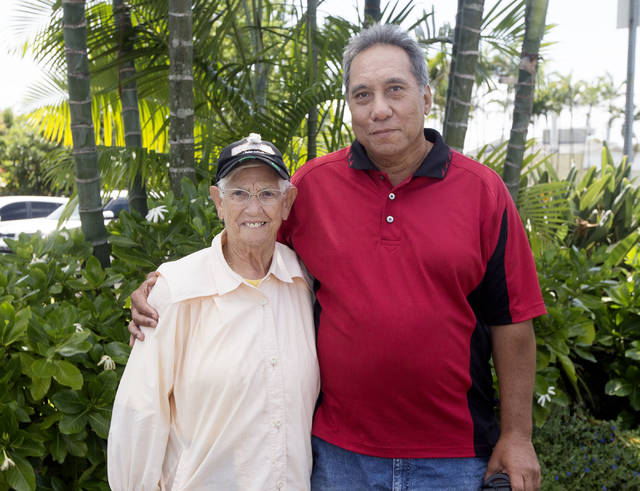East Hawaii’s major provider of services for homeless residents is shifting strategies.
CEO Brandee Menino said a change in HOPE Services’ philosophy from long-term transitional housing for men to shorter-term emergency housing is just one example of “quite a bit of changes” to speed getting people on the street into housing.
“All of the changes kind of happened at the same time,” she said.
Previously, the Hilo-based nonprofit had a men’s shelter and dining hall on Kapiolani Street, with offices and a nearby family shelter for women and children.
Now, the family shelter remains and HOPE Services tells men’s shelter newcomers that the goal is to get them into permanent housing as quickly as apartments become available. That’s part of the “housing first” philosophy proven effective nationwide.
“We’re really focusing our … model on a ‘housing’ shelter model,” Menino said.
Case managers check to see if shelter newcomers have IDs, jobs and benefits for which they qualify. They connect the men with potential landlords.
Instead of trying to get bipolar disorder stabilized, deal with PTSD, find sobriety or treat other chronic health conditions, the most-effective means of getting an individual out of homelessness, providers have found, is a stable place to live.
Medical needs aren’t ignored, but the top priority is stable housing.
Once housed, services such as job coaching, mental health counseling, budgeting classes, traumatic brain injury services, chronic medical condition checkups or addiction programs can kick in.
Previously, single men could stay in HOPE Services transitional housing up to 24 months at the Kapiolani shelter while transitioning to stable housing.
But the owner of that location, Glad Tidings Church, wanted to reoccupy the building. HOPE Services moved its men’s shelter to apartments that are part of St. Joseph Catholic Church in Hilo and changed it to an emergency housing model.
As of last week, there were 16 emergency beds available for men at the new location. HOPE Services is adding capacity until it gets to 32 beds, hopefully by the end of July.
Each two-bathroom, two-bedroom apartment will house eight men.
Each apartment includes a kitchen, and “in our shelters, we provide food supplies,” Menino said.
That means a daily breakfast is no longer needed. Breakfast previously was offered by Under His Wings, a Hilo homeless organization, until it ceased in April.
Susan Ruth “Grandma Sue” Feldner, well known by the homeless in the Hilo area, has been trying to find a place to again offer breakfasts.
Feldner’s former Under His Wings colleague, Moses Gonsalves, said they will continue seeking a building with a certified kitchen, a van or both for the meals.
“No matter who you are, your greatest need is love,” Gonsalves said. That, he said, is what he and Feldner try to offer.
The two joined weekly meetings attended by advocates, the county and service organizations. The meetings are intended to make sure the most vulnerable individuals get into housing fastest.
The longer someone has been homeless, the greater the individual’s vulnerability rating. Injury, multiple emergency room visits, mental illness or physical illness increase a person’s vulnerability ranking.
“The people with the most needs get the most resources,” Menino said.
“We’ve been looking for alternative sites for homeless people in Hilo,” said Lance Niimi, assistant administrator for the county’s Office of Housing and Community Development, who is overseeing the county’s response to homelessness for Mayor Harry Kim.
Once a single, centralized site is found, he said, existing laws against overnight camping in parks will be enforced.
Instead of telling homeless people “you can’t camp in the park,” county officials want to be able to say “you can’t camp here, but we have a place where you can.”
But Gonsalves said he thinks that’s essentially an effort to keep “people from being visible.”
“Theoretically, it sounds good,” he said. “In real life, I don’t know if they can actually do that.”
Menino said she’s hopeful the county will keep HOPE Services updated so “assertive” outreach can be done before the county changes how it treats people who camp overnight.
“If they were in one place, it could be easier,” Menino said. “But would they go to one location — is another story.”
The county is hoping for a land swap in West Hawaii that will give homeless residents on that side of the island a place to camp. The hope is to do the same in Hilo, Niimi said.
“We’re a little behind on the Hilo side,” he said.
In Puna, HOPE Services recently sold 21 small housing units that were languishing on Catholic Church land in Pahoa.
As of last week, only 13 of the units remained on-site, and Menino said the new owner expects to keep removing about one daily, pending weather, and should be done in a couple of weeks.
The units, as a group, were sold to an undisclosed Pahoa buyer for $26,500 at public auction online. That money, Menino said, will be put toward funds for new construction of affordable housing on property owned by the Catholic Church in Pahoa. HOPE Services previously raised nearly $400,000 to do that.
“We’ll soon be getting a lease agreement with the church,” Menino said last week.
The agreement will cover 14.5 acres of the church’s land currently designated as agricultural. HOPE Services hopes housing development there will be allowed. A previous exemption for a single acre of housing was granted. HOPE Services expects the new Puna housing to be complete in the next year or two.
The nonprofit is asking residents who have extra space, such as an ohana dwelling or a spare room, second home or spare floor to rent it. Everything from studios to four-bedroom openings are needed.
Email Jeff Hansel at jhansel@hawaiitribune-herald.com.






